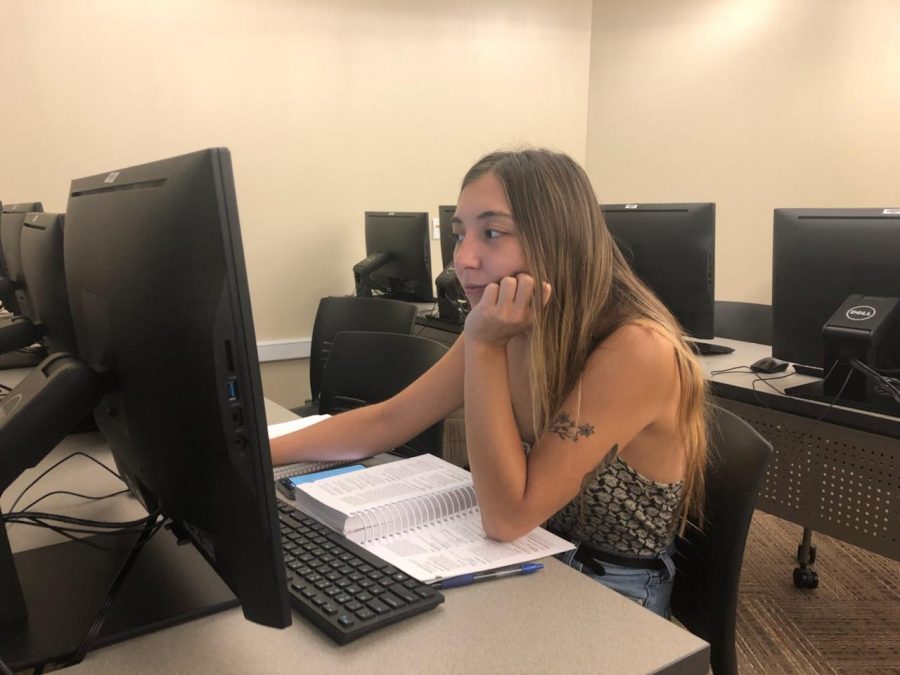The evolution of learning environments
How online classes compare to traditional classroom settings
Kiko Dixon, international studies and public relations junior, completes an online assignment. Photo by Dante Mills
September 19, 2018
If you’re a student who works full time, is raising a child or has other responsibilities, it may be difficult to fit a three-hour class into your schedule. But maybe you also find it difficult to learn math outside of the traditional classroom.
IU Southeast offers a variety of ways for students to receive their education. Whether a student wants to take traditional classes on campus, online classes or a hybrid of both, the student has the freedom to determine which style of learning they prefer and fits best with their lifestyle.
According to the IUS website, online classes are available for students who want to “learn on their own schedule.” However, determining whether or not to take classes online or on campus is not always an easy decision for some students.
The learning experience in traditional classes and online classes tends to differ due to various educational approaches used.. But how drastic is this difference? Naturally, with anything, there are pros and cons.
We asked IUS students their opinions about taking classes online or on campus.
“During summer, I would prefer online classes, because I get to spend my summer not trapped in classrooms, but I would prefer on-campus classes during fall and spring semesters,” Kiko Dixon, junior, said.
IUS alumnus Brodie Hillegas had a different opinion.
“I would prefer to take classes on campus,” Hillegas said. “When you take classes online it takes more willpower.”
He added that, with a job and other responsibilities, it becomes harder to set aside time for online classes.
“I learn better being in an environment with other people and an actual professor. I am more of a hands-on person,” Hillegas said.
Dixon and Hillegas agreed they feel more comfortable in a traditional classroom setting. They also acknowledged the flexibility of online classes as being one of its best aspects.
Regarding online classes, Dixon added, “You have more privacy being by yourself, which can help you focus.”
Hillegas said he feels that if you are a self-motivated, disciplined person, then online classes can offer thesame level of education, but that on-campus classes work best for him.
Dixon believed that neither on-campus classes nor online classes are more impactful than the other, and that it simply comes down to personal preference.
Gaining the perspective of two students who have taken both styles of classes provides insight, but Gregory Phipps, senior lecturer and coordinator of the sociology program, offers a professor’s perspective.
Phipps noted that while online classes require more of his time as a professor, he feels they offer students a greater degree of “flexibility and convenience.”
He added that while the flexibility of an online class is great, you don’t see the same level of interaction online that you would see inside the classroom.
“We create discussion boards to get students to participate, but it’s not the same as being in the same room with a group of people where you can read their body language and facial expressions,” Phipps said. “I don’t feel as personally connected to the students as I would in a face-to-face setting.”
When it comes to a difference in grades, Phipps said his students tend to have more success in the classroom, as opposed to online.
Sharing Dixon’s mindset, Phipps also pointed out that online courses are more likely to fill up in the summer compared to the fall and spring semesters.
“I can only speak for my course, but I find that the grades are just a little lower in the online classes compared to face-to-face, and I have a slightly higher withdraw rate in the online classes,” he said.


